What Is the Best Test for SIBO: Lactulose or Glucose Breath Testing?
What is the best test for SIBO? Is it the lactulose or the glucose breath test? The answer may surprise you. Let’s dig into the details.
Episode Intro … 00:00:42
The Research on Lactulose vs. Glucose Testing for SIBO … 00:03:15
Why Lactulose Testing Has a Higher False Positive Rate … 00:10:18
How to Reduce Potential False Positives with Lactulose Testing … 00:15:45
Why Have Confidence in Lactulose Testing … 00:20:35
Problems with Glucose Testing … 00:22:15
Positive Lactulose Test with No Symptoms … 00:23:53
Test Depending on Symptoms of Diarrhea or Constipation … 00:25:07
Gary’s Final Thoughts on SIBO Testing … 00:26:51
Focus on Symptom Resolution Over Lab Values … 00:30:04
Episode Wrap Up … 00:32:58
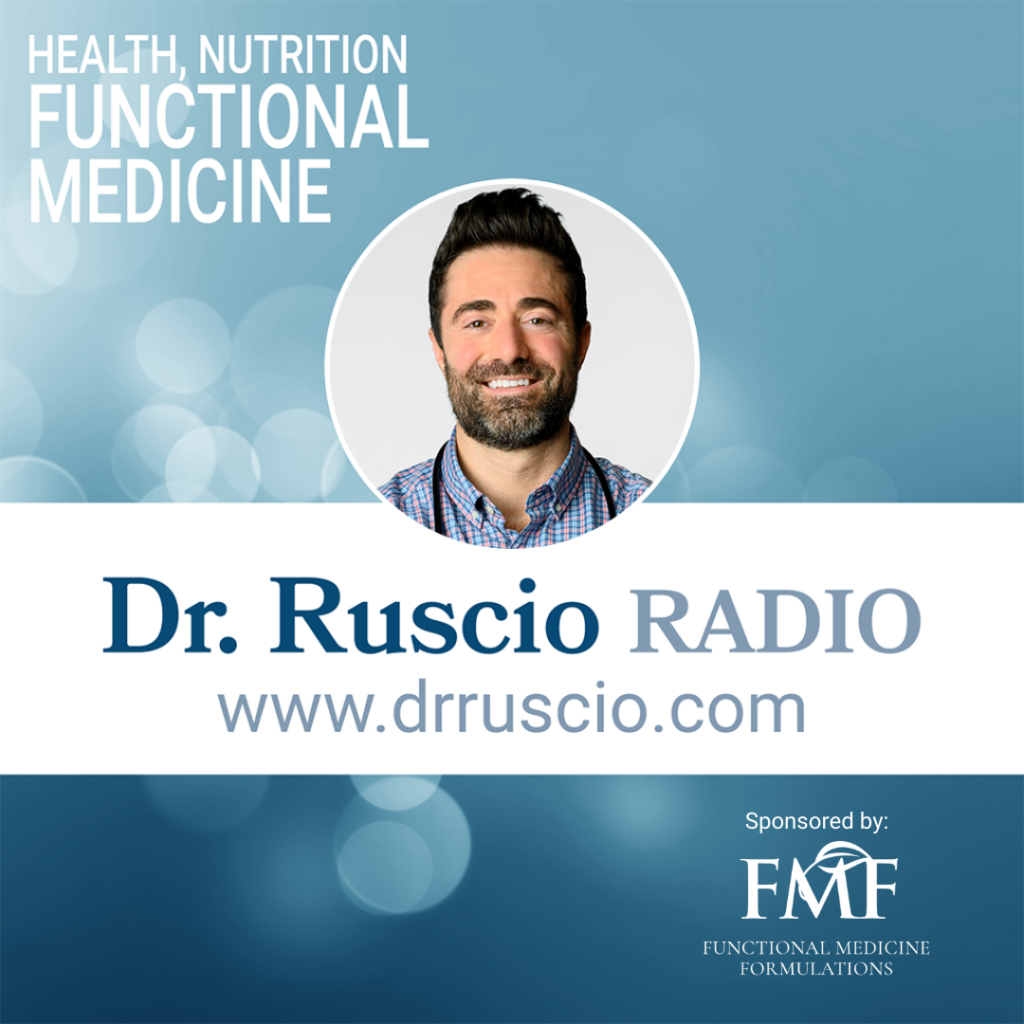
Download this Episode (right click link and ‘Save As’)
Episode Intro
Dr. Michael Ruscio, DC: Hey, everyone. Welcome to Dr. Ruscio Radio. This is Dr. Ruscio. I am here with Gary Stapleton, who is the owner of Aerodiagnostics Lab, which does a lot with SIBO testing. And we are going to be discussing something today that I think will be very, hopefully, eye opening for people, which will be the lactulose versus glucose breath test.
And you may have heard that lactulose is the current favorable test. But there’s definitely some data to challenge that. And Gary was actually the first person to bring this to my attention. And he’s kind of been following this issue. So I thought we could have Gary on and kind of pick into this issue and help people get a more updated narrative on this. So Gary, welcome to the show and thanks for being here.
Gary Stapleton: Oh, thank you for the invite. And I do look forward to the conversation. It is a topic that many clinicians will call me with. So thank you for inviting me.
DrMR: Absolutely. And I guess thank you for initially bringing this issue to my attention. And to kind of give people some of the backstory on my end—Gary had mentioned this several months ago. And when people say things to me, I don’t always change my clinical practice because of them. But I always listen. And I stay attuned to things going forward that may reinforce that. So you had made that comment, Gary. I found that interesting.
And as I follow all the published literature—published abstracts in PubMed—I saw a few studies rolling out over the months that supported the position that glucose may actually be a better substrate to use for SIBO testing than lactulose. And when I started pulling on that string, I started to see something that I think is reminiscent to what we saw with vitamin D research, which is that recommendations were expert driven, not necessarily data driven. And sometimes, that’s okay. Sometimes, we don’t have a lot of data, and we just have to follow the lead of the expert, the person who is most, I guess, knowledgeable about a certain topic.
But in this case, I think we have quite a bit of data now that helps us answer this question of what is a better test—glucose or lactulose. And to give people the short answer, I think glucose is actually worth a second look. And glucose may be a favorable testing medium compared to lactulose.
The Research on Lactulose vs. Glucose Testing for SIBO
So Gary, what I’d like to do is start off with my thoughts on this, which might actually be quite a bit lengthy. But if you can bear with me as I get all my thoughts out there and, more importantly, the data that we’ve come across in doing a review of the literature on this issue, I’ll start with my thoughts. You can then follow with your thoughts. And then we can try to see or leave people with what the practical “here is what you should maybe do differently in light of this” recommendations to close.
GS: Fantastic. Thank you.
DrMR: Okay. Cool. So the conclusion, the short conclusion—I’ll try to start with the short conclusion first and then go into all the details—you have a higher likelihood of finding SIBO when you use lactulose.
But you have a higher probability that that’s going to be what’s called a false positive, meaning the person comes back positive on the lab test but they don’t actually have SIBO. You have a lesser chance of finding SIBO on glucose testing. But it’s more likely to be a true positive.
So looking at this issue in a little more detail, there has been a meta-analysis (1) validating the breath test in IBS. But the meta-analysis did not conclude that abnormal breath test findings imply SIBO, per se, but altered fermentation or potentially dysbiosis. So we have good scientific-level data showing that altered findings in the breath test support dysbiosis but maybe not SIBO, per se. We’ll put the link to that meta-analysis in the transcript (2).

Also, there’s been one review paper written about urinary testing. And I was not impressed at all with the references supporting that. I appreciate the author and their attempts. But I don’t think when he went through the literature there was really a whole lot of literature to support urinary testing. So without getting too tangential, we’ll put that link in also.
But let’s now look at some of the references that support the position that glucose may actually be better, because I think most people listening to this are probably a bit taken aback by that position. So let me provide you with the data to hopefully help you update your opinion. And we’ll put all the links to the PubMed abstracts in the transcript.
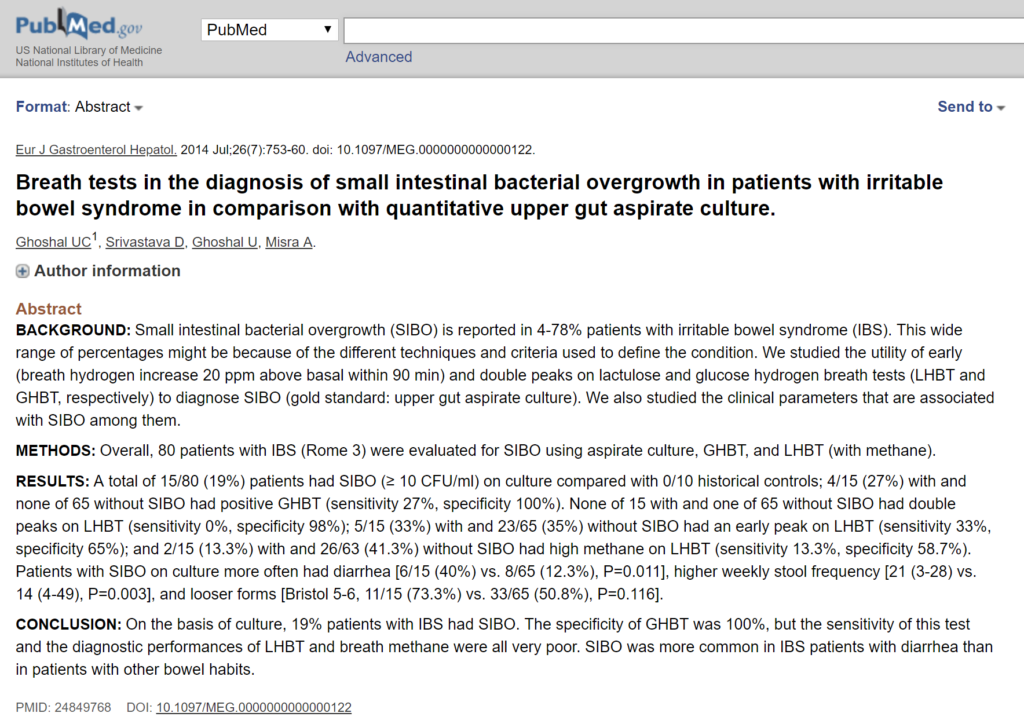
So to quote a paper (3) entitled “Breath Tests in the Diagnosis of Small Intestinal Bacterial Overgrowths in Patients with Irritable Bowel Syndrome in Comparison with Quantitative Upper Gut Aspirate Culture,” “The specificity of glucose testing was 100%. But the sensitivity of this testing in diagnostic performance of the lactulose test were [sic] very poor.”
Coming to another paper (4), comparison—and this is, I think, really important because we have a comparison of lactulose and glucose breath testing. So in patients that have IBS, when we test them with lactulose, 34% were positive. But the controls—in the controls tested with lactulose, 30% were positive. Now, with glucose, 6% of patients with IBS were positive for SIBO, but only 0.6% of controls were positive for SIBO.

So what we see when we do a lactulose test on those with IBS compared to those with controls is you have about the same level of positivity—the same percentage of people are positive—whereas there is a difference between the positive percentages—or how many people are diagnosed positive with SIBO when we use glucose. And I think that’s a really important point.
And we’ll put in here—there have been one, two, three, four, five other studies that have reinforced that the lactulose testing seems to show a percentage of positivity for SIBO that is very similar in those with IBS and those with controls. And again, why that’s relevant is the people with IBS should have SIBO.
The people who are healthy controls shouldn’t really have SIBO. And so if we’re seeing the same percentage roughly of people with IBS compared to healthy controls that test positive for SIBO, it tells us that the test may be over reporting SIBO or giving us what’s known as a false positive.
So coming to another study (5) here entitled “Lactulose Breath Test Does Not Discriminate Patients with Irritable Bowel Syndrome from Healthy Controls,” kind of the same thing found again. The majority of patients with IBS and healthy subjects met the criteria for abnormal lactulose breath testing, or positive lactulose breath testing, leading these authors to conclude, “The utility of lactulose breath testing in its current form as a diagnostic tool in IBS requires critical reappraisal.”
We’ll put another study (6) in here, another comparative study, looking at lactulose breath testing in IBS compared to those with functional bowel disorders compared to healthy controls. And so we have IBS versus functional bowel disorders versus healthy controls. The percentage positive for SIBO was 44%, 41%, and 40% respectively.
So again, we see that the amount of healthy people who test positive for SIBO is very close to the amount of people with IBS or other functional gut disorders. So again, it is very much suggesting that the lactulose breath test may be over reporting.
In another study (7), the authors essentially conclude that glucose arguably has greater testing accuracy. And just a couple more here—bear with me. And I apologize that this is a bit dry. But I want to give people the data. A study (8) entitled “How to Interpret Hydrogen Breath Tests,” essentially the authors find that glucose hydrogen breath testing is more acceptable for the diagnosis of SIBO than is lactulose.
And gosh, it’s so many. Another study (9) we’ll put in here entitled, “Small Intestinal Bacterial Overgrowth Syndrome,” the diagnostic accuracy of glucose was found to be 72%. The diagnostic accuracy of lactulose was found to be 55%.

And that pretty much brings me to the end. There are one or two other studies (10) (11) (12) that are essentially supporting the same thing. We will put all of the references with a couple short notes in the transcript so people can dig into those. But I think in coming to the end of my little rant here, we see definitely a good amount of evidence that, if nothing else, challenges the position that lactulose is the best testing medium.
Why Lactulose Testing Has a Higher False Positive Rate
So, Gary, what would you add or potentially disagree with, with that?
GS: Well, thank you for that. And that is exactly the conversation that we need to be having. And, Dr. Ruscio, the fact that you addressed each of those—these are many of the peer-reviewed work that we have discussed in recent months. And I think it’s important for the group to know that. So it’s not in disagreement whatsoever with what I’ll say here. But I think it’s in addition to.
But it also allows you to have the confidence in much of the work you’ve already done. You’re out there. And I’m speaking generally to the audience. You’re out there. You’re using lactulose by and large, to your point, Dr. Ruscio. And there should be a lot of confidence in that even with everything that you mentioned. Now, it is not—my comments aren’t to take away from anything that you’ve mentioned. So why do I make that? Why do I say you should still have confidence in lactulose? You just—I think the question, the follow-up question to everything that you mentioned is, so why is that?
So that is accurate. Everything that you mentioned is accurate. There isn’t one piece of data that I’ve found that actually provides a counterpoint to it. And that’s what I came across in the beginning. And that is what led to my energy going into this and looking for the answers.
DrMR: Sure. Sure.
GS: Our work, where I spend my days, I use both very successfully. So why is that? Why can that be, given everything that you said? It’s because it’s in the interpretation. And why is that? The best that I can discern from the data, from all of that data you just cited—that’s the data that I poured through. The best that I can discern is—and to really make it very basic without trying to be overly basic—that lactulose has a laxative effect and can increase gut motility.
And in that, a laboratory or an individual who is interpreting a lab report can interpret the data incorrectly. So is it that lactulose is a bad substrate to use? Or is the interpretation a bad interpretation of the data that you have? And I found—and I really worked on this in my mind. And what I love about this show that we can do here is that we can have this conversation real time, you and I, for the benefit of the folks listening.
So what do I mean by “the interpretation”? So we all know—and speaking with many of the thought leaders, including you, on this, we do need a lot more consensus on interpretation, a centering on how we interpret these tests. Or a classic user, new reviews all have valid points.
But the most important thing is when we’re looking at SIBO and we’re trying to discern whether or not we have presence of bacteria in the small intestine, we’re looking at a time period following the ingestion of a challenge dose. And we’re looking for an increase in parts per million of hydrogen and/or methane in the small intestine. And the reason why these studies accurately depict lactulose as having a higher false positive rate is because this increased motility in the gut can push that test tube number six and mostly seven into a real colonic data, so to speak.
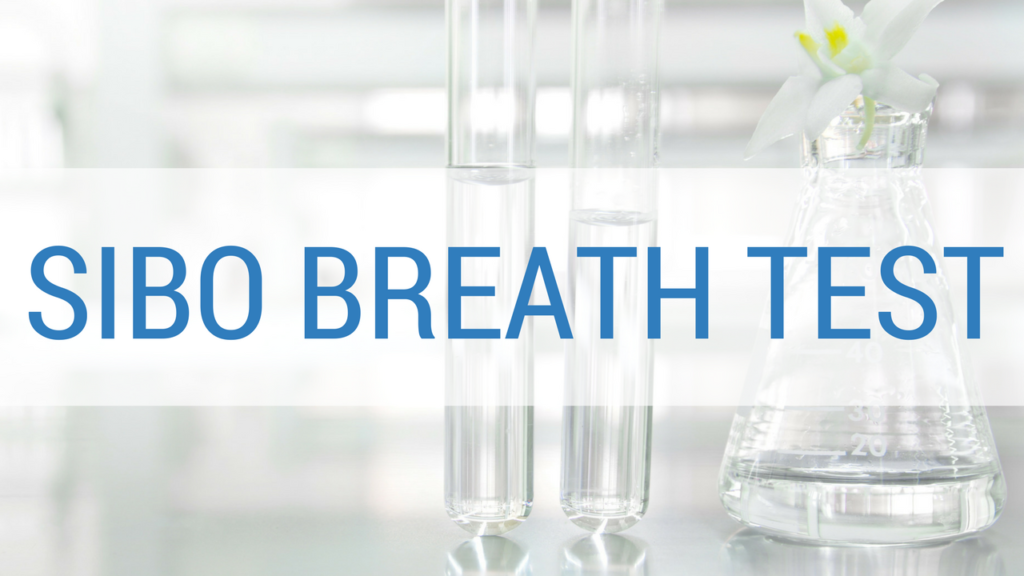
So with a lactulose breath test, you expect a bimodal peak. You expect a double peak. Everyone knows that. So why is that? Because what you’re seeing is the challenge dose being introduced in the small intestine. And then it’s working its way through the small intestine. And if it does meet up with bacteria and ferment, you’re having the yield of hydrogen and/or methane.
And that, if positive, will increase to 20 parts per million or more. If negative, will stay under 20 parts per million. And I know there are some other conversations about that, especially with methane, but that aside for a moment.
Then you go into a transition period where most times with lactulose you’ll see a decrease through the transition. And then you’ll see another increase when the lactulose hits the colonic bacteria. And then you’ll have the rise again of hydrogen and/or methane. So what you’re seeing, and the reason why sometimes lactulose could be called a false positive, is that test tubes six or seven, right toward the tail end of the small intestine, because of the increased motility can actually push that, because it’s a time test, into the colon. So what we’re really reading incorrectly is colonic data. And that is why we have false positives.
So it’s not that the actual lactulose is a bad substrate to use. It’s the application of it. And then, you might say, “Well”—and I do say this. I think both substrates can be very good. And I’ll save this for later after you and I kind of go back and forth on this. But there’s actually a benefit to using lactulose in one way. But let’s stay on this for a moment.
How to Reduce Potential False Positives with Lactulose Testing
So how do we reduce potential false positives, is where my mind started to go to. And the way that we do it—and we’ve seen this. And many of the folks that I work with will know because I’ll call them and we’ll have conversations about this. What we’ll see with false positives—or primarily it’s test tube seven.
So test tube seven, right in the transition area of this test—out of the ten test tube collections that are made—you’ll see that that will be the critical, only data point. That single data point makes the test positive. And we all know from our statistics and our background and our training that a single data point is not a good thing to hang your hat on.
So when I have a lactulose test that I’m interpreting and I look at a single data point of test tube seven making the test positive, I will typically have a conversation with the clinician. And we’ll talk about the clinical impressions. And we’ll marry that with the data. And that’s how we help to improve or reduce the false positives associated with lactulose.
So let me just pause there, Dr. Ruscio. I don’t know if I—
DrMR: Yeah, no. I agree. And that’s right where my mind goes. And I guess before I jump into that, I love the fact that you kind of explained some of the physiology because that’s definitely an important refresher for people who may not have reviewed the physiology for how the breath test works. And I agree with your point. It’s not that lactulose is bad. It’s just we need to know how to use it.
And I think you make an excellent point that if we’re only seeing a positive that’s kind of at the terminal end of the small intestine, with lactulose, we may want to be a little more suspicious or a little bit more critical with how we interpret that.
And it’s come back to something that we’ve discussed on this show a number of times, which is being a little bit more conservative, not rushing to a diagnosis, and trying to think a bit more conservatively and a bit more logically through these things. If someone only has very, very mild symptoms and their only test value is your measurement six or measurement seven, then maybe this person doesn’t truly have SIBO.

So I think you make some excellent points. And there’s also another point I should mention, which is—there is a link for this in our references. But what’s known as the orocecal transit is not the same in everyone. And especially in Asians, it’s been shown that they can have either a shorter small intestine or just a generally faster transit where we will see the substrate of lactulose get to the colon more quickly than we would maybe expect in some others which could, again, give us kind of a false positive.
So I agree that it’s not that lactulose could not be used. It’s just we’d have to interpret these things a little more cautiously. And I’m not sure what your thoughts are on this. But if I were to see a positive glucose toward measurement six or seven, I’d be more inclined to look at that as a positive, of course, than if it was a lactulose, always looking at the symptoms in context with that also. But I’d be less suspicious of that with glucose.
GS: Absolutely. And you’re right. To kind of dovetail onto what you’re saying here, that is why it’s so important to do three hours looking at this. You want to look at a period of time without being specific to 60 minutes, 70 minutes, 80 minutes, 90 minutes. What we’re doing is we’re taking a picture in conjunction with the clinical impressions to make the best possible decision for this patient.
That’s why many times I would call you, Dr. Ruscio. And I would say, “Talk to me about your impression on it. Talk to me about the conversation. How did it go? What are we really talking about? Was SIBO an afterthought because of something that was said? Or did they present with this being a primary issue for them?”
And then you marry this entire picture of the period of time that was evaluated that, when we know, because of the CO2, that we have valid samples. We know because the machines are very accurate and are calibrated in three different ways, the machines that actually measure the hydrogen and methane, that we know that these are real data points. So we can marry that with the clinical impression and do a great job with it. So to your point, Dr. Ruscio, glucose at six and seven, it’s in the data. It says how accurate it is clearly.
Why Have Confidence in Lactulose Testing
So the one thing that I would say to kind of go back to my initial comment is, so why should you have confidence in all the lactulose tests that you have? Because first of all, you still have the data. It’s an interpretation. We can always look. We can always look back at this data and say, “Was this positive only because of one data point?”
So there’s always that option. But lactulose is good.
And let me give you the one—I’ll give you one. There are many. But I’ll give you one benefit to lactulose. Let’s assume for a moment we have a negative lactulose breath test. If it’s negative, we’re not going to have a rise of parts per million of hydrogen or methane in the small intestine.
We all can agree to that. What if at test tubes eight, nine, and ten, where we know for sure we’re in the colon, we don’t get a rise? So that then can tell me, hold on here. We could have a false negative with lactulose. So lactulose can give us some very good data. Conversely, glucose, by the data, is very accurate for small intestine. And so why—and I’m kind of—actually maybe I should just pause there a moment. I don’t know what your thoughts are on that.
DrMR: No, I definitely think that that’s a utility of the lactulose is you’re going to see what’s happening in the large intestine. You’re not exactly sure when you’re getting there. But you’ll see eventually a window into the large intestine whereas you’re not really going to be getting that with the glucose. So yeah, I think that’s a good point.
GS: Absolutely. And thanks for that. The other thing that I’ll mention about glucose—the elephant in the room.
Problems with Glucose Testing
The elephant in the room is, well, every thought leader uses lactulose. Everyone talks about it. And there’s this big conversation—and rightly so—that if glucose is absorbed in the small intestine, you could miss a distal infection. That’s it. That’s the elephant in the room. I would not necessarily disagree with that. It makes sense to me. The problem is there’s just no data on it.
DrMR: Right. Right.
GS: And I would love to see data on it. So what I say to that is here’s the other part that challenges me. That may be absolutely, 100% accurate. The challenge is I’m still getting parts per million readings from glucose well past test tube seven and eight, well past 180, 190, 200 minutes.
So just because it may be absorbed, I’m not sure that that has an impact on the actual readings because it is there. I don’t know that the work has been done to say, “If glucose doesn’t reach a bacterium that is currently present at the very distal end, then the glucose that was at a certain point didn’t completely travel to that end.” There’s just—the work wasn’t done on that.
So it’s a great, great position to have. It’s a great theory to have. It’s a great one for us to investigate moving forward. We just don’t have any data to support that if you make that choice as a clinician you’re going to miss a distal infection. It’s a great point. I just don’t see it because I’m getting parts per million readings with glucose well into nearly 200 minutes.
Positive Lactulose Test with No Symptoms
DrMR: And I come back to what the studies say. It does seem fairly consistently to be shown that the lactulose will over report. And then the question comes back to it’s not necessarily, I guess, a good or a bad, but we just need to be cognizant of these things because the other thing I think we need to be careful about is not over treating and over diagnosing.
And this may account for why we see some people “never able to clear SIBO.” And I’m making some assumptions here. But I’m more so inclined to think that some of these people, they’re never able to get their labs normal. But their symptoms may be gone.
And we’ve had a few patients that we’ve had patient conversations with and kind of chronicled their cases where their symptoms have been gone but their SIBO has still been present. And so for those using lactulose, I think this is a very important thing to keep in mind that, because lactulose may over report—or I shouldn’t say “may”; it’s been shown to over report—you have to be cognizant of that for when to stop treating if the symptoms are gone but the labs are still positive.
GS: Absolutely. Very good points.
Test Depending on Symptoms of Diarrhea or Constipation
DrMR: Now, Gary, here’s something that I have been toying with as just kind of a theoretical in my mind, which has completely no data to support it but just my internal thinking. And I’d be curious to see what your thoughts are on this. For someone that has constipation, I’d be more inclined to think lactulose may be a better medium for them because perhaps you’ll have a lower chance of a false positive.
And for someone with diarrhea, potentially glucose would be better because you have less of a chance of it rushing through transit and getting to the colon and causing a false positive with them. So what are your thoughts on preferentially using lactulose for those who are constipated, and for those who have more of a diarrheal presentation using the glucose?
GS: I think intuitively, it would make sense. And I don’t know that I would have an argument against that if I were—and this is the first time it’s been posed to me. So I will give some thought to it. But I would say this also. We don’t know that that patient with constipation, just by the use of lactulose, if that will impact that position of constipation with that agent.
DrMR: Right.
GS: So we don’t know. But it seems very logical to me.
DrMR: Gotcha. Okay. That’s just something that I’ve been toying with an idea. And of course, there’s no data either way on that. This is just complete supposition.
Gary’s Final Thoughts on SIBO Testing
So any other thoughts, Gary? I have some kind of ideas for clinicians and patients in terms of what does this mean? And what do you do? But before we kind of transition to that, any other thoughts that you want to cover?
GS: Well, I think—well, thank you for that. And I think, just to kind of round up everything that we discussed thus far, I know many clinicians out there have used lactulose. And I think we would be remiss to say that you weren’t doing the—it wasn’t the wrong choice. It’s—
DrMR: And I should include myself in that. Not to cut you off. But I’ve been classically using lactulose for years. And now, I’m doing kind of a 50/50 approach with lactulose and glucose just to see if I can tease out any observations. So I should say, I include myself in this criticism.
GS: Well, right. And I wouldn’t because you—the data is there. When we say the false positives, regardless of that, with the addition of adding methane eval on this and the good machineries that are available in the testing environment now, you’re doing good patient work.

So I would not want someone to feel concerned about the use of lactulose at all. It’s all in the interpretation. We can only make it even better. And I think if we had to—if the test had to err based on a substrate, I would—not that I like erring on an over call. But the under call would probably have an increased detrimental effect on the patient.
So I think we’re—lactulose is a good substrate. After the things that we’ve discussed, you know how to look at it now. And if you don’t, I’ll open this up. Hope you don’t mind, Dr. Ruscio. I’m sure both of us would be more than willing to speak with anyone in more detail about it.
I would also say—and this is—in fact, we know that we have clinicians out there. In the Unites States, lactulose is a prescription. And many clinicians didn’t have access to lactulose. So they didn’t utilize the testing. Therefore, they may have either pushed the patient to someone else. Or they may not have done the work at all. This, I think, further validates that you have the access. You have the access to good tests that, with no inhibition because you have the right tools in hands, that you can use without that as a concern.
DrMR: Yeah, I think that’s well said. And I guess a few things—maybe to transition this into, what does this mean? And what do you do? I think you make an excellent point, Gary, which not to say that lactulose testing has no utility.
And that’s exactly what I’m doing. I’m using both right now to see if I can get some kind of intuitive sense through observation what potential subgroup might do better with one test or the other. And at some point, maybe we’ll just try to run combination testing on people and see if we can find any interesting corollaries. But certainly, there are pros and cons here.
Focus on Symptom Resolution Over Lab Values
I think it’s important to mention that because of some of this disparity with testing we should focus on symptomatic resolution over lab values. And I like what Mark Davis said when he was on the podcast a number of episodes ago, which is, “SIBO is a lab finding. IBS is a symptomatic presentation.”
So I think it’s important to focus on the clinical picture and not get overly wrapped up in the lab values. Use the labs to try to steer decision making, as you said earlier, Gary. And I totally agree with that. We want to use the labs to help guide us and help us make the best decision that we can. But we also have to always be aware of the fact that lab testing is not perfect. And we can’t be limited in our thinking and in our action based upon the lab values.
And to just reiterate something I had said previously, if the labs are positive but the symptoms are gone, then in my opinion, you’re probably done or close to done. If their labs are negative and they still have symptoms, we still have work to do.
And I think it’s really important, for providers especially, to keep that in mind that we shouldn’t just stop helping patients if they still have symptoms but their labs are normal. And conversely, we shouldn’t keep treating patients if they’re feeling fine and their labs are abnormal. So those couple of things, I think, are really important to mention.

And then also, I think, because no testing is perfect, it’s important that we qualify someone before we test them. And what I mean by this is we should have someone hopefully have tried at least a couple attempts at a healthy diet. Maybe they try paleo. Maybe they try low-FODMAP. Certainly, getting them off lots of processed food and getting them toward a more whole food diet—we’d want to do that, in my opinion, before testing to increase the accuracy. And we’d also want to make sure their lifestyle is in decent order. And then also potentially having someone try an acid enzyme supplement and/or a probiotic and see what kind of results we have there. Especially, if nothing else, probiotics have some pretty compelling data in the treatment of IBS.
So I think it’s important that we qualify someone and we don’t rush into the SIBO testing as soon as there are IBS symptoms because we have a decent probability that something like paleo, low-FODMAP, enzymes, probiotics, getting a little bit more rest, little bit less stress will be able to ameliorate the IBS symptoms and therefore make the SIBO testing unneeded.
So those are a few things that I think are important in terms of how to contextualize this. And then what test you use, I really think you can use either test and be successful as long as you kind of work within some of those parameters that I just laid out. So those are kind of some of my thoughts in terms of what to do with this information. And please add whatever you like, Gary.
Episode Wrap Up
GS: Well, thank you. I don’t think there’s much more to add other than I think this is a big conversation. It’s a continuing conversation. It’s one that we should always have. And it’s a combination effort between the work that we do in the lab and the work that you do with the patients. And our doors are always open.
DrMR: Definitely. And Gary and I are in periodic correspondence. And if there are any major breakthroughs in this area, we’ll definitely do a follow-up episode and have you on, Gary. And of course, if there is anything really interesting that you come across, keep me in the loop, and let me know.
And again, if anything noteworthy comes about, we will do another episode to make sure we continue having this conversation because at some point, things here will probably shift. So it’s important that we just all keep an open mind and try to constantly be evolving our opinion.
GS: Absolutely. Thank you.
DrMR: Well, thank you, Gary. And please, tell people about where they can kind of track you down or hear more about you.
GS: Oh, sure. Well, thank you for that. Our laboratory is Aerodiagnostics—that’s all one word. And we can be found on the web at Aerodiagnostics.com. And our phone number and email for customer service is on there. Always willing to assist even with an interpretation on tests that you may have had with other laboratories. That’s absolutely fine. If you have any questions or if we can assist you or your patients.
DrMR: And I have to just say, Gary, I’ve been really impressed with your commitment to service, with your commitment to patients, with your commitment to making the testing as smooth as possible because sometimes it can get kind of hairy if you don’t have good communication between the patient, the doctor, and the lab.
So I really like the way you’re doing things. And if I were to run a SIBO lab, I’d probably run it pretty similar to the way you’re doing it. So I just want to give you credit where credit is due because I think you’re doing a really good job.
GS: Well, thank you. Really appreciate that. Thanks.
DrMR: Absolutely. Well, Gary, thank you again. And everyone, thank you for your time and attention. We’ll see you guys next time.
Dr. Michael Ruscio is a DC, natural health provider, researcher, and clinician. He serves as an Adjunct Professor at the University of Bridgeport and has published numerous papers in scientific journals as well as the book Healthy Gut, Healthy You. He also founded the Ruscio Institute of Functional Health, where he helps patients with a wide range of GI conditions and serves as the Head of Research.


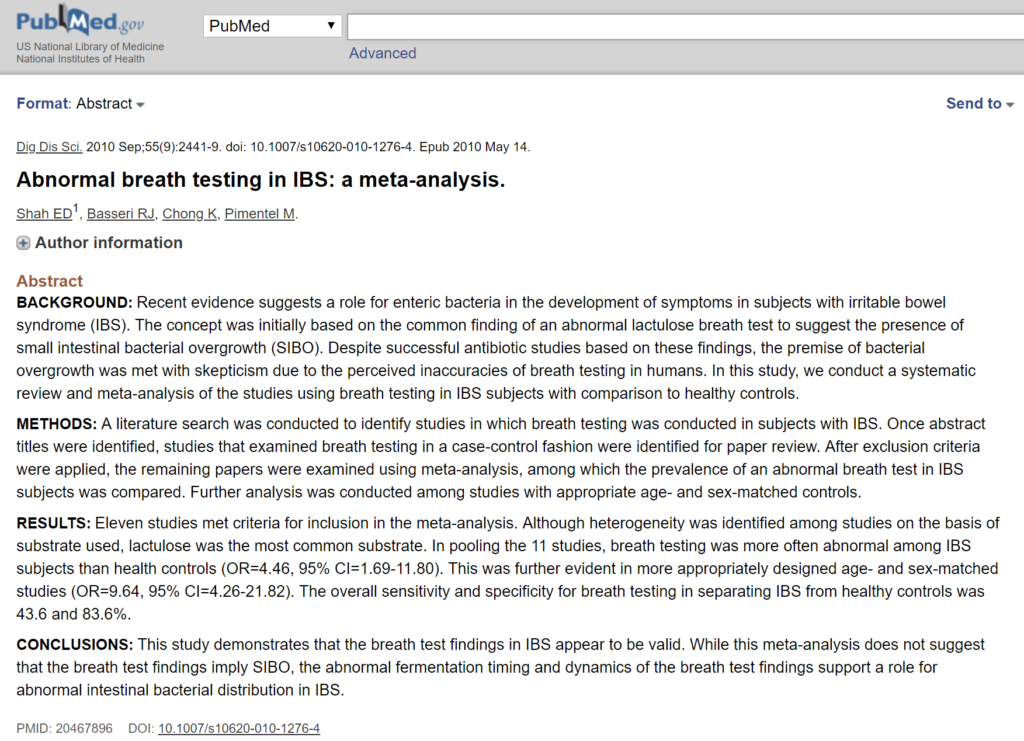
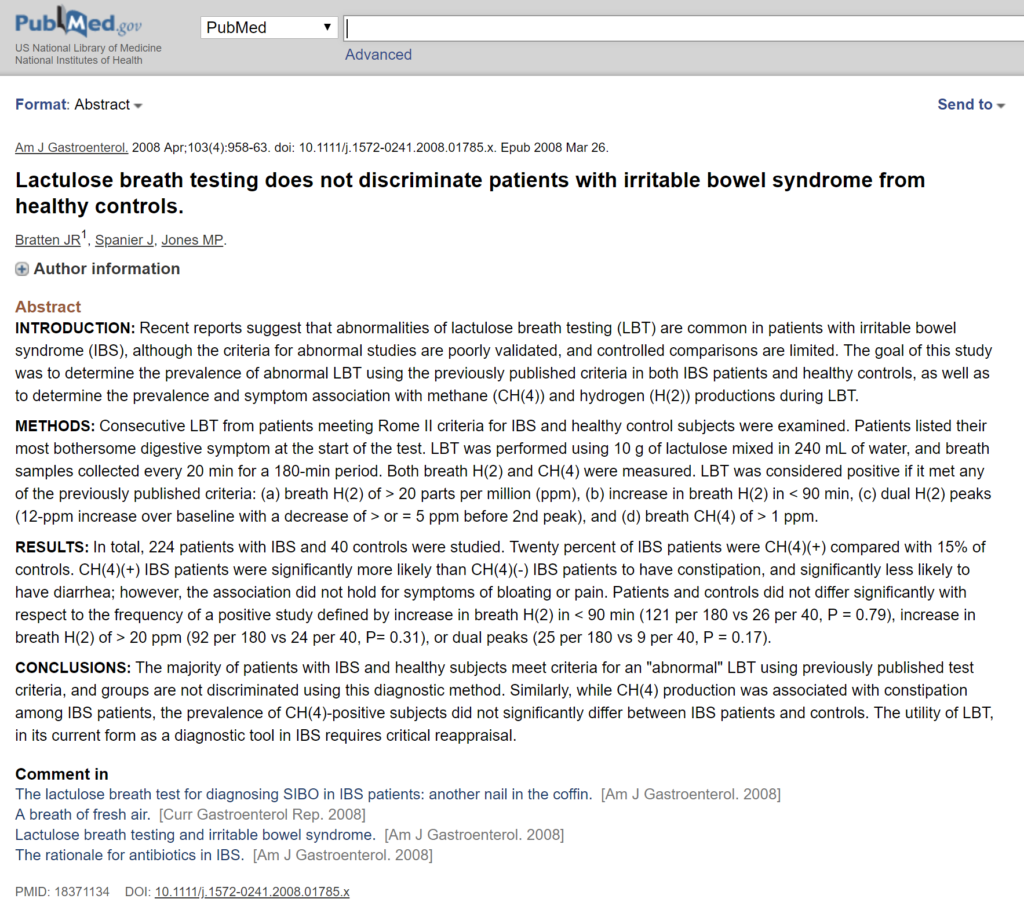
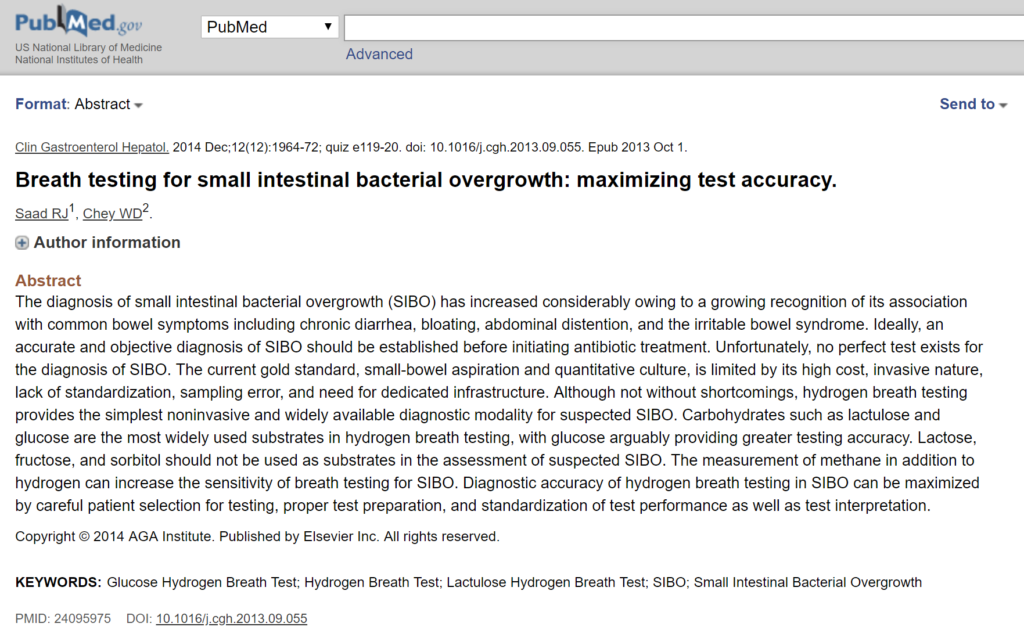

Discussion
I care about answering your questions and sharing my knowledge with you. Leave a comment or connect with me on social media asking any health question you may have and I just might incorporate it into our next listener questions podcast episode just for you!